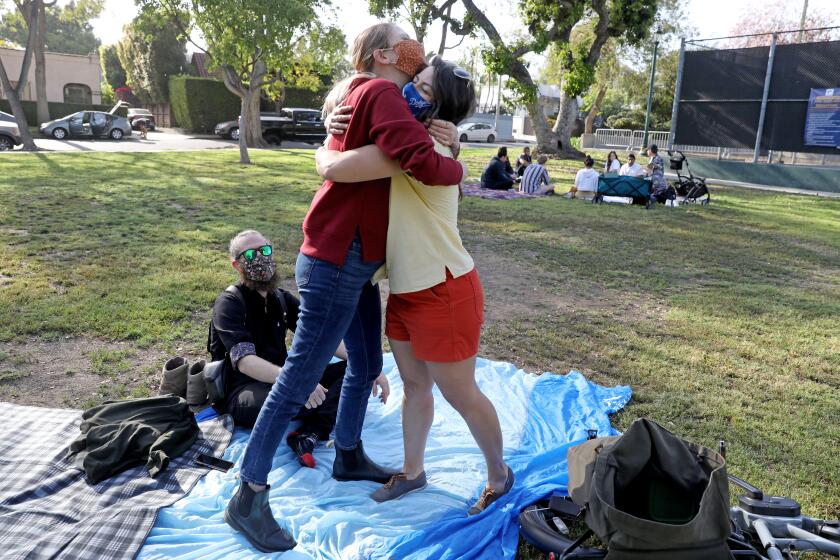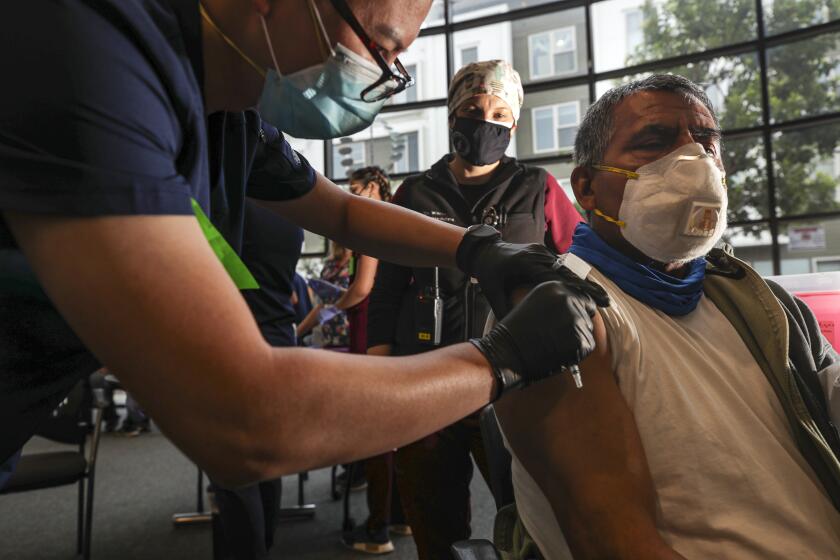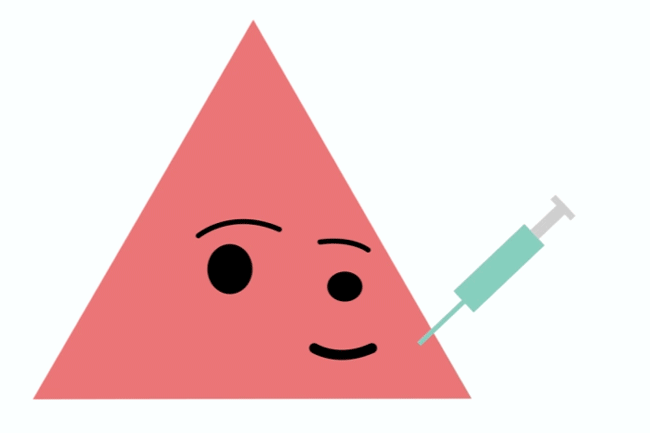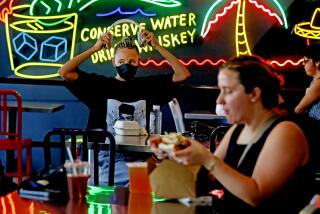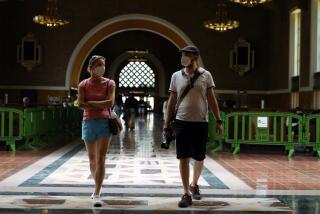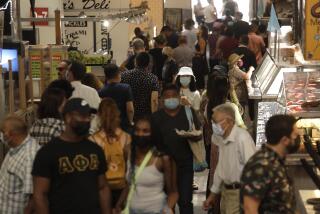For some of us, returning to pre-COVID life is turning out to be harder than we expected
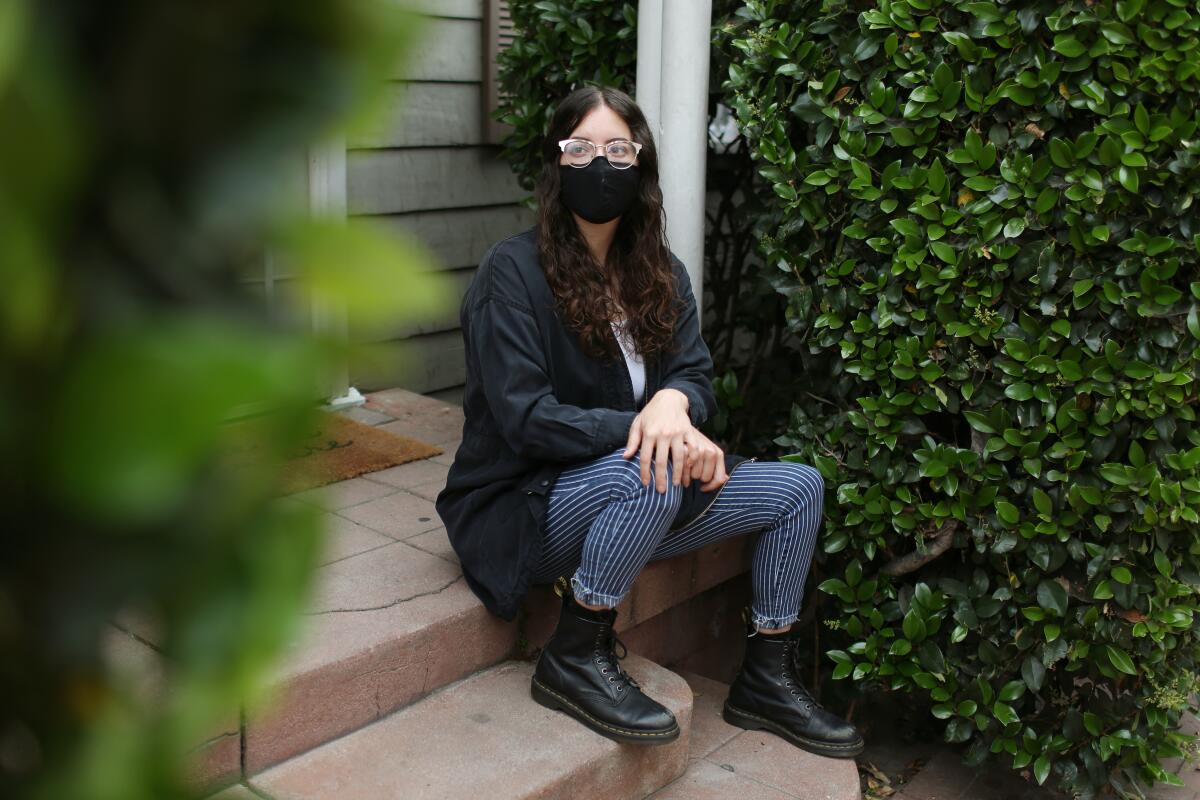
- Share via
Shelby Bernstein can’t wait for life to get back to normal.
In theory.
But as COVID-19 restrictions lift across the county, Bernstein has found herself feeling increasingly anxious.
“Maybe it’s like Stockholm syndrome, except our captor is the coronavirus,” she said. “We’re all so used to the mental and physical havoc it wreaked upon us that any sense of normalcy feels wrong.”
Over the course of the pandemic, the 29-year-old product photographer limited her trips to the market, went a month without seeing her boyfriend, and only met up with friends at parks — mostly masked and six feet apart.
She returned to in-person work at a Santa Monica jewelry company in July, but spent most of the days in a bungalow by herself. She even tried to limit her bathroom trips to avoid being in enclosed spaces with other people.
Intellectually, Bernstein knows that her risk of getting COVID-19 in Los Angeles is significantly lower than it’s been in a year. Cases in the county have plummeted since reaching a peak in January, and more than 50% of the adult population in the state has received at least one shot. In addition, Bernstein received her first dose of vaccine a few weeks ago, giving her significant protection against the disease.
Maybe it’s like Stockholm syndrome, except our captor is the coronavirus.
— Shelby Bernstein
She’s not a hypochondriac or a hermit. She misses parties and getting on a plane to see friends. But she’s still not ready to ease up on the behaviors that have kept her safe — and given her peace of mind — this past year.
Medical experts say her concerns are valid. About 26% of Americans are fully vaccinated, and 40% have received their first shot. That still leaves most Americans unprotected.
At the same time, they note that for fully vaccinated people, activities like hugging or eating in a restaurant are safe, especially if vulnerable friends and family members are vaccinated as well.
First routine, then forbidden and now cherished, hugs have come to symbolize the next phase of the pandemic
But while the experts say vaccines offer excellent protection from the virus, some people can’t help but feel it all sounds too good to be true. And though cases and deaths are on a downward trend in California, they’re rising in other parts of the country.
As with just about everything in this pandemic — family gatherings, business closures, schools — Angelenos’ feelings about the county’s reopening run the gamut from elation to alarm.
Some of us have jumped at the chance to see movies in actual theaters, grab a drink at a bar, cheer the Dodgers or attend a small dinner party with fully immunized friends. Yet for others — even the fully vaccinated — the fear that any relaxation of safety protocols will lead to another surge is hard to shake.
“Every time I see people eating out or hanging out with their friends unmasked, I cringe and feel hopeless,” Bernstein said. “I hate feeling like this, but unfortunately for me and many others, I think this looming sense of dread will be with us for a long time.”
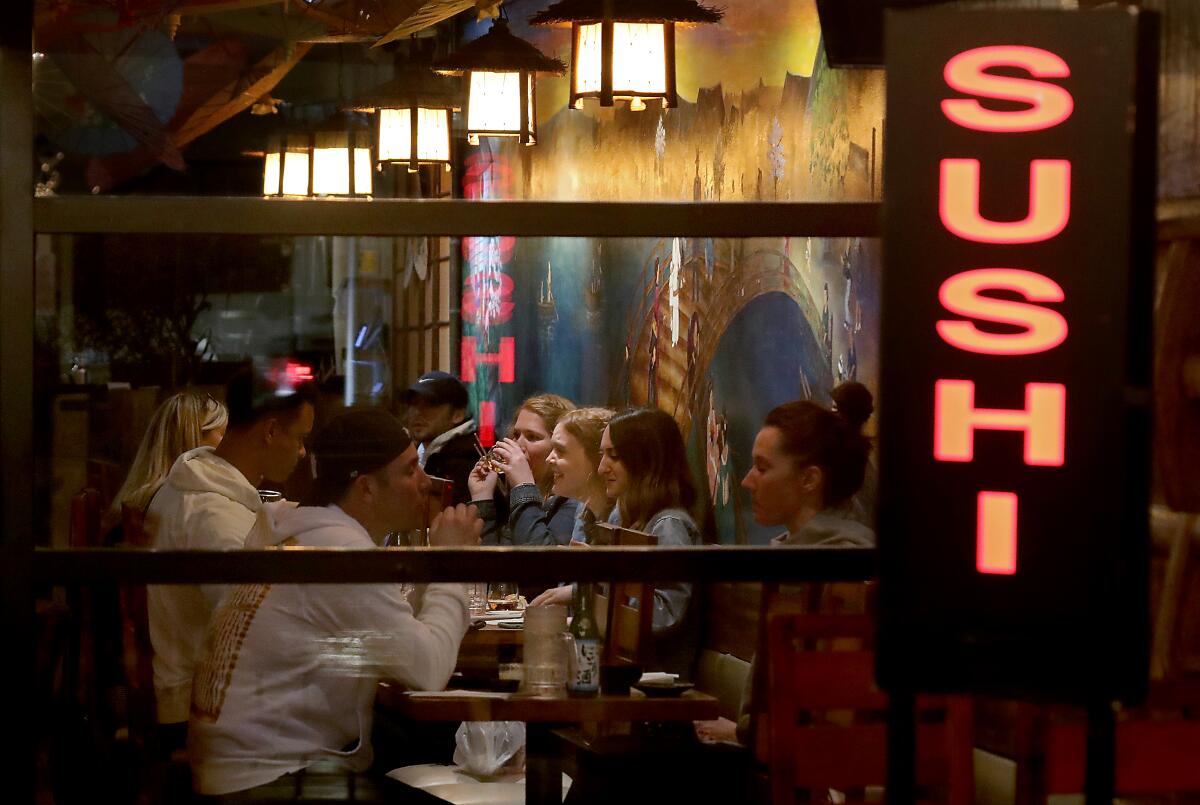
A recent survey by the American Psychological Assn. found that 49% of Americans feel uneasy about adjusting to in-person interactions once the pandemic ends. Similarly, 46% said they don’t feel comfortable going back to their pre-pandemic life.
In both cases, those who felt trepidation were just as likely to be vaccinated as not, said Vaile Wright, the association’s senior director for healthcare innovation.
“This suggests that the vaccine in and of itself is not an anxiety reducer, or at least not an anxiety eliminator,” said Wright, who worked on the study. “We have been in this routine for a year, and to change out of it is going to take some time.”
With COVID-19 vaccines becoming more and more available, it’s hard for some people not to feel left out.
Dr. Ella Shadmon, who is a family practice physician in Pasadena, recently traveled with her husband and two teenage daughters to Arizona for spring break. It was the first time the family had been on a plane since the pandemic began.
As a medical professional, Shadmon received her first vaccine shot in January. Her husband and one of her daughters are fully vaccinated as well.
The family donned N-95 masks for the short flight from Burbank to Phoenix and stayed at an Airbnb once they got to Sedona. They dined at restaurants — outdoors — and checked to make sure the staff was fully masked first.
Because she’s vaccinated, Shadmon doesn’t feel at risk for getting COVID-19. Still, she found herself grappling with a range of feelings throughout the trip.
“It was strange. It was exciting. It was too crowded. It was filled with mixed emotions,” she wrote in a Facebook post. “Reentry is not as easy as it looks.”
Reentry is not as easy as it looks.
— Dr. Ella Shadmon
For Shadmon, this murky space where we are no longer in the middle of the pandemic, but not quite out of it either, has been the hardest phase to navigate.
When cases were high and vaccines scarce, it was easy to know what needed to be done to stay safe: Stay home as much as possible. Wear masks. Maintain physical distance.
“Now we’re in this middle ground,” she said. “And as every state, county and community does something totally different, it makes it 100 times worse.”
She’s no longer worried that she or her vaccinated family members will become vectors for the disease, but what about others? Have all those people dining indoors at restaurants received the vaccine? In both Arizona and California, the answer is likely no.
“When will the feeling that crowds are wrong go away? I’m not sure when I’ll personally get there,” she said. “I think we need full herd immunity. But when we get to at least the 50% [vaccination] mark, I think I will feel very different.”
Reports about new coronavirus variants and their potential to overcome the protection of vaccines have also added to some people’s anxiety.
“There is such an enduring feeling of lack of safety and trust because information is constantly changing about the variants, the efficacy of the vaccines and how long immunity lasts,” said Laurie Stone, a psychologist in West Los Angeles. “I don’t trust much of it.”
Stone received her second vaccine dose in February, but that’s small comfort.
“I still have this chronic apprehension,” she said. “It’s hard to soften the fear.”
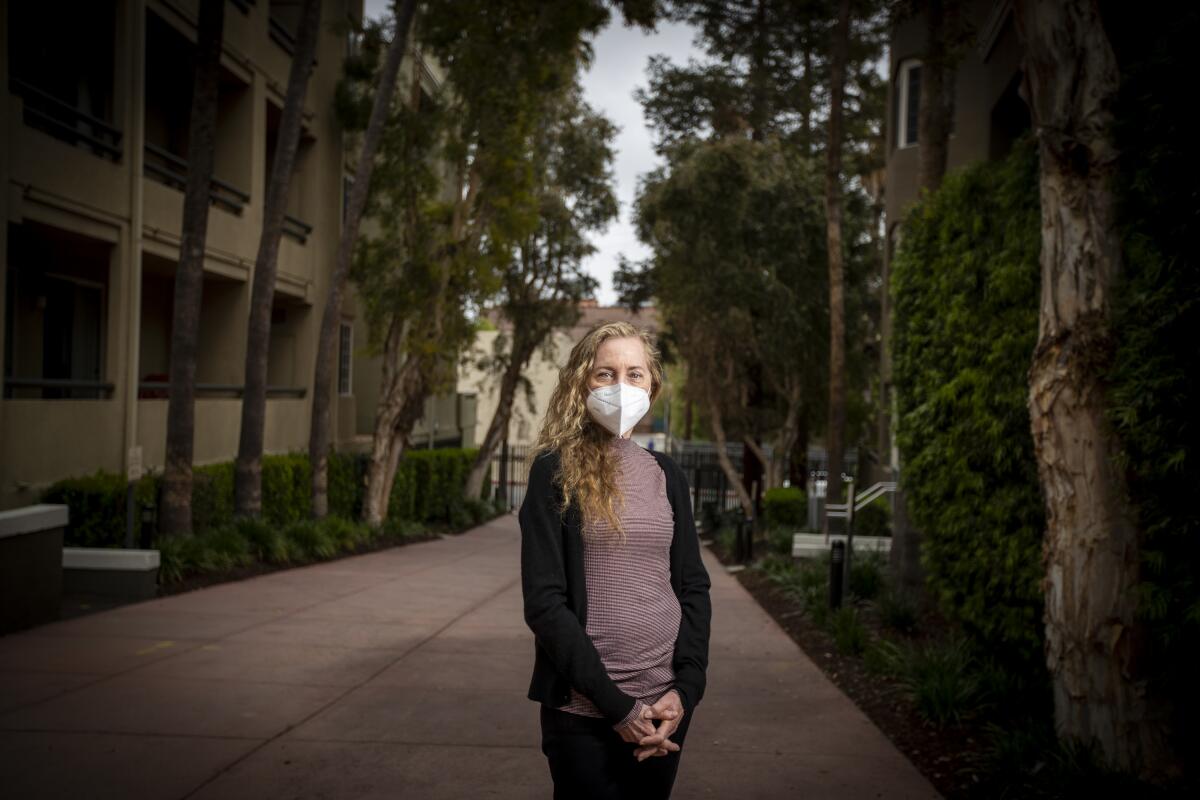
Dr. Marybeth Sexton, an infectious disease specialist at Emory University School of Medicine, said it makes sense that even vaccinated people feel anxious about reopening, especially when the majority of Americans are still unprotected.
For unvaccinated people, “it is critical that they continue to do the things we know work — wear a mask in public, keep your distance from people and avoid the things that can lead to super-spreader events like indoor dining, drinking at bars and large indoor gatherings,” Sexton said.
But she said those rules do not need to apply to people who are vaccinated.
“If you are vaccinated, doing those things is very low risk,” she said. “Two weeks after your second dose of Pfizer or Moderna, or your first dose of Johnson & Johnson, your risk of getting the virus is dramatically reduced and the risk of being hospitalized or dying is almost zero.”
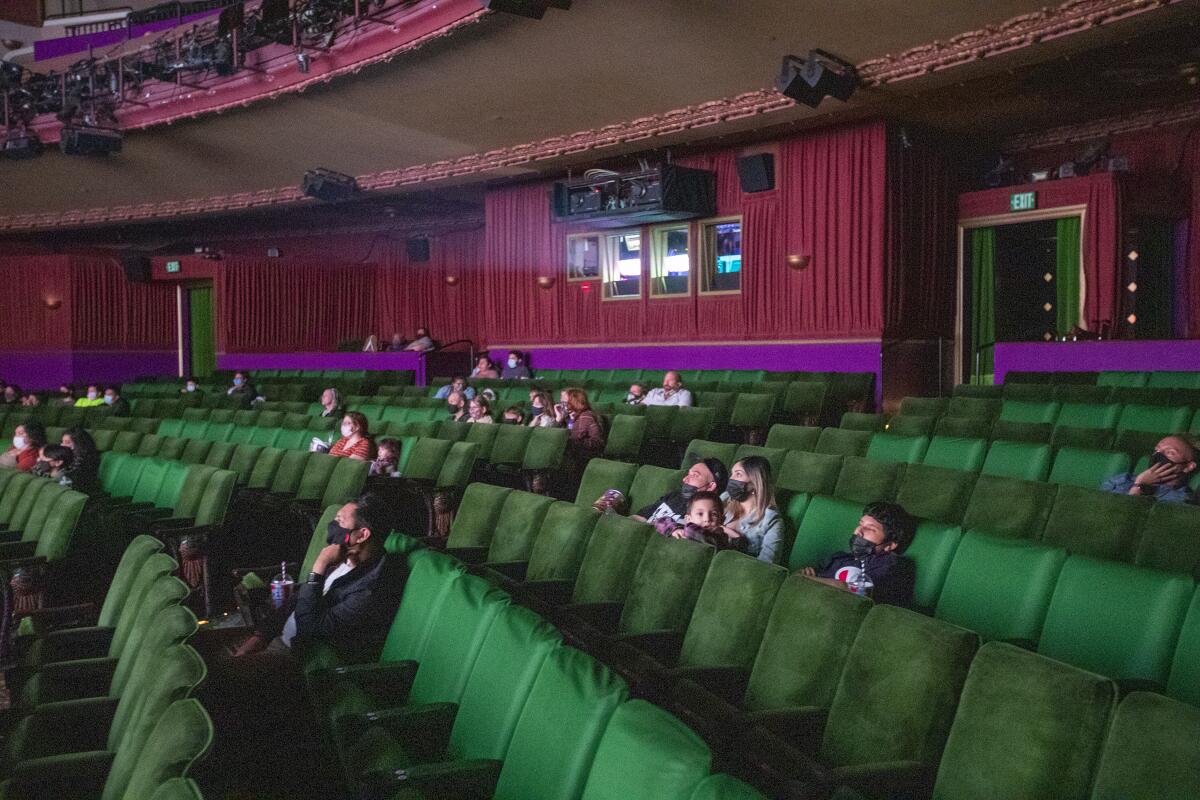
Chunhuei Chi, director of the Center for Global Health at Oregon State University, agreed that fully vaccinated people could safely go out to dinner and a movie but added that nobody should expect everything to go back to pre-pandemic ways all at once.
“The return to normalcy is not a quick jump; it’s incremental,” he said.
Even in Taiwan, where there have been no new coronavirus cases for more than six weeks, the government still requires people to wear masks on public transportation, Chi said.
For those who are experiencing extreme anxiety, Charmain Jackman, a psychologist and wellness expert, recommends mindful focus on the present.
“If you are spiraling, notice it, pull back and don’t judge yourself,” she said. “Worries about the future can be intense. Be in the present moment. Don’t get too far ahead.”
You’ve gotten your first COVID-19 vaccination appointment. Step through these scenarios to see if you know how to live post-vaccine.
Another thing to consider: Judging others for taking fewer precautions hurts your own mental health.
“We don’t know why people are making the choices they are making. There could be a good reason,” she said. “It is helpful to think about it that way for your own self-care and peace of mind.”
Attaining that peace of mind might come by reentering society gradually.
You might start with something relatively easy, like going to the grocery store with a mask on, said Wright of the psychological association. Then experiment with a small backyard gathering and later a meal at an outdoor restaurant.
“When we practice avoidance, we implicitly tell our brains ‘It’s too scary’ or ‘I can’t handle it,’” Wright said. What can reverse those messages is confronting safe situations.
We all have different tolerances for uncertainty, she said. Some of us may only feel comfortable if we can be assured that we are 100% safe.
But that will always be elusive — whether we’re in a pandemic or not.
